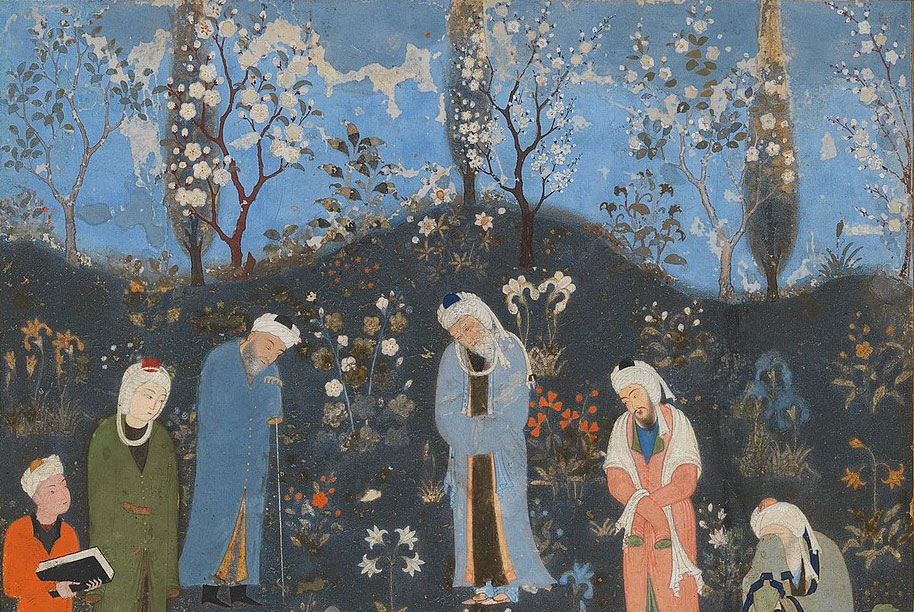Ansari and the One Hundred Fields
Bismillahirrahmanirrahim
Dearest Shaykha Amina, Circle Guides and Dervishes,
Already for some time my heart has felt heavy about the work with the 100 Fields of Shaykh Ansari, ra, and the way I am approaching it.
The feedback from a few of you is enthusiastic about the study and from others less than enthusiastic. Others do not even read the letters at all. I know that in every project there is some attrition so I would not expect everyone to continue applying themself to the study. But I can sense when there is a more widespread lagging of interest. And then I begin to wonder whether this is the right direction to be moving.
Part of the problem comes from not having kept up a rhythm of sending the Makams out. Without a rhythm we lose interest. Also, I did not follow Shaykha Amina’s good example of asking for a commitment from whoever was interested in the study to actually apply themselves to it daily.
But I think there is also a deeper problem in the way the 100 Fields are analyzed by the Shaykh. The tone and method feel foreign to most of us. There is a strong element of Scholasticism that our contemporary culture is not drawn to. Scholasticism is the logical dissection of a subject that was practiced by Aristotle, and then later by Christian philosophers in Europe in the eleventh, twelfth and thirteenth centuries. It is interesting to note that Ansari was born in the early eleventh century. So there seems to have been a widespread tendency toward classification and analysis in both the Christian and Islamic spheres. After the bursting forth of prophecy thru the heart of the Prophet Muhammad, pbuh, and the early movements of Sufism running in his footsteps, there appeared around the tenth and eleventh century a desire to record and organize the large body of knowledge that had been gathering for four centuries through the direct experiences of the mystics and followers. So we find many works on Sufi concepts and terminology and studies of the stages of the Sufi path by the mystics themselves. These are immensely precious palaces of knowledge in the brilliant city of the Prophet Muhammad’s knowledge that we have the great privilege to explore and to nourish ourselves from.
Today we seem to be gifted, by Allah’s immense grace, with the ability to imbibe the knowledge through our pores and to move quickly. We are the children of the mystics and Allah has blessed us with a new freedom and a new responsibility. We are entering a cycle in which we again desire direct experience, without excessive structure. Many of us grew up with Thoreau as a model of living life freshly and apart from social conventions. Walt Whitman played the beautiful music of the earthly soul. Native American holy people, Quakers and mystics who took shelter in this land, all planted the seeds of the new heaven and the new earth. Science taught us to look with our senses and to draw fresh conclusions. Art made us expressive, spontaneous and trusting of what was within. Music brought us to dance freely on the earth. A few lines of Attar formed in the sky and we looked up. Rumi appeared, and we became bewildered and set out on the path of seeking God in human form. Effendi came to us and we drank the eternal wine and confirmed the pre-eternal promise to Love. Nur painted with Muhammadan words of light the cosmic drama of love unfolding in the seven earths and seven heavens and then drew up the curtain. We are once again in the unchartered lands of the early days of Sufism. Effendi and Shaykh Nur and Nureddin Jerrahi and Mevlana are the guides of our drunken boat. Ibn Arabi is the North Star. Fatima and Prophet Muhammd, Mary and Jesus, Moses and Buddha, White Buffalo Calf Woman and Krishna, peace be upon them all, are our Imams, our islands of refuge, our rivers of knowledge and delight, our holy places of prayer. Each of us contains the whole creation. Each of us has been entrusted the Amana from Allah. Each of us is the way, but we have no way without each other. So we have found our ways through each other in the great Caravan of love and bewilderment, paying the price of the journey with our limited self.
Recognizing this birthright of the new humanity, it becomes paradoxical to pour the new wine into old bottles. Yet we still need a bottle for the wine. So I would like to re-consider the 100 Fields of Ansari in this new light, looking at ways in which to bring in Shaykh Nur, possibly looking for the 100 Fields within Shaykh Nur’s writings, and bring that as fresh water to the somewhat dry earth of the Sad Madyan.
Heart in heart in the One Heart
Fariha Fatima Nur
Habiba Ashki in Boulder is working on inspired contemplations on the verses of our Ansari ilahi transmuted by Shaykh Nur, the Mystic Guide.
I am sure she would like to share her work with you if you write to her.
